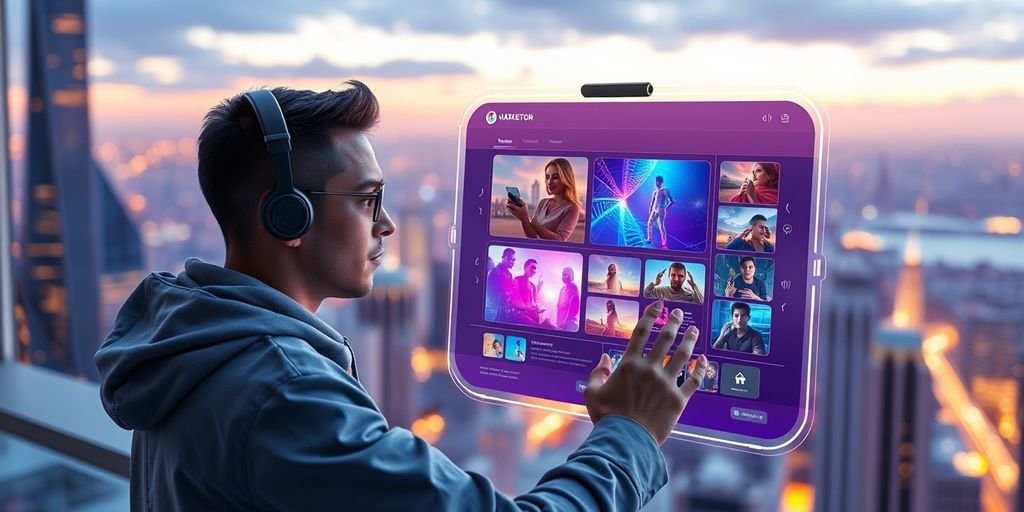In the rapidly evolving landscape of content marketing, generative AI models have emerged as a groundbreaking force, reshaping how businesses create and tailor content. As companies strive to maintain a competitive edge, the synergy between human creativity and AI-driven tools is unlocking new potentials for personalized and effective content strategies. This article delves into the trending wave of generative AI in business software, highlighting its transformative impact on content creation and the success stories that have marked its rise.
Key Takeaways
- Generative AI models are revolutionizing content marketing by enhancing creative processes and enabling personalized content at scale.
- Successful integration of generative AI in marketing strategies has led to measurable improvements in engagement, efficiency, and ROI.
- Real-world case studies demonstrate the tangible benefits of generative AI, with significant increases in content relevance and audience resonance.
The Creative Synergy Between Human Insight and Generative AI
Enhancing the Creative Process with Generative AI
The advent of generative AI has revolutionized the way marketers approach content creation. By integrating Generative AI into their strategies, businesses are not only automating mundane tasks but also unlocking new creative potentials. This synergy allows for the production of content that is both innovative and resonant with human emotions, ensuring that the essence of storytelling remains intact.
Generative AI tools are particularly adept at handling large volumes of data to identify trends and preferences, which can then be used to tailor content more effectively. For instance, AI-driven analytics can reveal insights into audience behavior, leading to more personalized and engaging content strategies.
The future of content creation is being shaped by Generative AI, where the focus is on enhancing creativity and maintaining authenticity in marketing communications.
One of the trending topics in the past three months has been the ethical use of Generative AI. As these technologies become more prevalent, businesses must navigate the complexities of intellectual property, authenticity, and the potential for misuse. It’s crucial for marketers to uphold ethical standards while leveraging the capabilities of Generative AI to ensure that the content remains true to the brand’s values and mission.
Tools and Technologies Powering Generative AI in Marketing
The landscape of marketing technology is rapidly evolving with the advent of generative AI tools that are reshaping content creation. These tools are not just about automating tasks; they are about enhancing the creative capabilities of marketing teams, allowing them to produce content that is both innovative and aligned with SEO strategies. A recent survey highlighted that 38.5% of participants see generative AI as a complement to SEO, indicating a trend towards a more integrated approach to content marketing.
Generative AI is revolutionizing the way marketers approach storytelling and audience engagement. By combining human creativity with AI’s generative power, marketers can craft narratives that resonate more effectively with their target demographics.
Collaboration between human marketers and AI systems is key to unlocking the full potential of these technologies. Brands like Deloitte Digital have successfully integrated generative AI into their workflows, setting a benchmark for innovation in digital content strategies. As we look to the future, the list of tools that marketing teams will need continues to grow. According to Sprout Social, there are essential AI marketing tools that are becoming indispensable for teams aiming to connect with their audience and extract valuable customer insights.
Here are some of the trending tools and technologies in generative AI for marketing:
- AI-powered content generation platforms
- Data analytics tools for audience insights
- Personalization engines for tailored content
- SEO optimization software integrated with AI
- Collaborative AI tools for team workflows
Case Studies: Success Stories in Content Marketing
The recent surge in Generative AI adoption has led to a series of transformative success stories in the realm of content marketing. One notable example is the e-commerce sector, where AI-driven personalization has been a game-changer. A case study by McKinsey & Company revealed that an e-commerce behemoth harnessed generative AI to tailor product recommendations, achieving a remarkable 25% increase in customer engagement.
The synergy between generative AI and human creativity is not just theoretical; it’s a reality that’s reshaping the marketing landscape.
In the competitive field of SEO and content marketing, industry leaders are recognizing the dual benefits of quantity and quality that generative AI offers. Crystal Flores, a senior digital marketing manager at Gigamon, acknowledges the potential of AI-generated content to amplify marketing efforts. However, she also voices a common concern regarding the balance between innovation and maintaining quality standards that align with search engine guidelines.
The following table summarizes the impact of generative AI on content marketing success stories:
| Industry | AI Application | Result |
|---|---|---|
| E-commerce | Personalized recommendations | 25% increase in engagement |
| SEO/Content Marketing | AI-generated content | Enhanced quantity and quality |
The Impact of Generative AI on Content Marketing
Enhancing Content Quality and Relevance
In the realm of content marketing, generative AI is revolutionizing the way content is crafted and consumed. As the technology matures, it’s becoming increasingly adept at producing high-quality, relevant material that resonates with audiences. This is particularly evident in the trend towards personalized content, which has been shown to significantly improve user engagement.
One of the key benefits of generative AI is its ability to automate content creation processes, thereby speeding up production without sacrificing quality. Marketers are now able to produce a larger quantity of content, but the challenge remains to maintain the high standards that meet customer needs. As highlighted in recent discussions, content that feels authentic and human-written tends to perform better in terms of ranking and user satisfaction.
The integration of generative AI into content marketing strategies is not just about working smarter, not harder; it’s about striking the right balance between quantity and quality to genuinely serve customer needs.
Looking ahead, preparing for the next wave of the content marketing revolution involves strategizing for AI-driven content creation. This means staying informed about the latest developments and understanding how to leverage AI for maximum impact. The following points outline the critical considerations for enhancing content quality and relevance with generative AI:
- Ensuring consistency in the voice and style of AI-generated content.
- Monitoring and adjusting for quality variability, as AI-generated content may require human intervention.
- Utilizing feedback loops to refine AI models and improve content personalization.
- Staying abreast of trending topics to keep content timely and engaging.
Tailoring Content to Audience Preferences
In the realm of content marketing, generative AI is revolutionizing the way content is tailored to audience preferences. By leveraging advanced algorithms and predictive models, these AI systems can analyze vast amounts of data to discern consumer behavior patterns. This enables the creation of content that not only aligns with the interests and needs of specific demographics but also enhances engagement through its personalized nature.
- Personalization and Customization
- Generative AI can produce personalized content based on user preferences, leading to more relevant product recommendations and customized experiences.
- For e-commerce platforms, this translates into increased user engagement and higher conversion rates as customers encounter content that feels uniquely tailored to them.
The synergy between generative AI and data analytics paves the way for content that is not just relevant, but also deeply resonant with target audiences.
By integrating generative AI into their strategies, marketers can ensure that their content marketing efforts are not only creative but also data-driven and audience-specific. This approach is crucial in a landscape where personalized marketing is no longer a luxury, but a necessity to stay competitive.
Case Studies: Measurable Outcomes in Content Strategy
The integration of generative AI into content marketing strategies has demonstrated tangible benefits across various industries. Real-world examples showcase how businesses have leveraged this technology to streamline their operations, elevate their brand presence, and achieve significant returns on investment.
Deloitte Digital’s review of content marketing metrics underscores how generative AI has contributed to a 30% improvement in audience engagement and resonance with target demographics. These measurable outcomes underscore the tangible benefits that generative AI offers for content marketing endeavors.
The Impact of Generative AI on B2B Marketing Strategies
Discover how Generative AI is revolutionizing B2B marketing, increasing interest in products & converting more leads into customers. Explore the future of this transformative technology and its potential to reshape marketing strategies.
The reality of generative AI in marketing is that it is not a standalone strategy but a transformative innovation that can be applied to enhance existing strategies. In marketing, it introduces a new ability to engage and convert audiences more effectively.
Embracing the Generative AI Revolution in Content Marketing
The integration of generative AI into the realm of content marketing marks a pivotal shift in how businesses approach digital strategy and audience engagement. As we have seen through various case studies and industry reports, the adoption of generative AI tools not only enhances content quality and relevance but also significantly boosts efficiency, creativity, and personalization. Companies that leverage these advanced technologies are witnessing remarkable improvements in customer engagement and brand visibility, with some experiencing up to a 40% increase in content production and a 30% improvement in content resonance. In the face of rapid technological advancements, it is clear that generative AI is not just a fleeting trend but a transformative force that is reshaping the landscape of content marketing. Businesses that embrace this wave of innovation are poised to reap substantial benefits, forging deeper connections with their audiences and securing a competitive edge in the digital domain.
Frequently Asked Questions
What is generative AI, and how is it transforming content marketing?
Generative AI refers to artificial intelligence models that can generate new content by learning from existing data. It is transforming content marketing by enabling the creation of personalized, relevant, and high-quality content at scale, enhancing the efficiency and effectiveness of marketing strategies.
Can you provide examples of businesses successfully using generative AI in content marketing?
Yes, businesses like an e-commerce giant mentioned in a McKinsey & Company case study saw a 25% increase in customer engagement with personalized product recommendations using generative AI. Forbes highlighted companies experiencing a 40% increase in content production, leading to better audience engagement and brand visibility.
What are the primary benefits of integrating generative AI into content marketing strategies?
The primary benefits include increased content production efficiency, the ability to tailor content to audience preferences, improved content relevance, and the potential for higher engagement and return on investment. It also allows for creative expression while maintaining authenticity.



